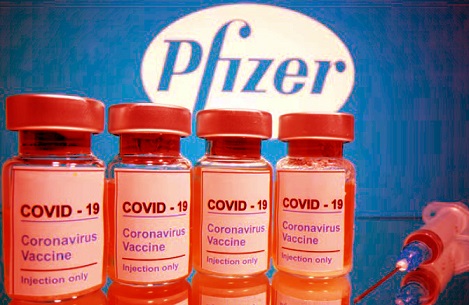Illinois Study Finds That COVID-19 Vaccines Do Not Prevent Long COVID Neurological Issues
Nikhil Prasad Fact checked by:Thailand Medical News Team Dec 12, 2024 1 year, 3 weeks, 5 days, 8 hours, 21 minutes ago
Medical News: A groundbreaking study conducted by researchers from Northwestern University Feinberg School of Medicine in Chicago, Illinois, has revealed that COVID-19 vaccines do not appear to prevent neurological manifestations of long COVID. The findings challenge earlier assumptions about the protective role of vaccines against long-term complications of SARS-CoV-2, especially in the context of neurological health. This research, conducted by a team of experts led by Dr. Igor J. Koralnik, has significant implications for understanding and managing long COVID, officially known as post-acute sequelae of SARS-CoV-2 infection (PASC).
 Illinois Study Finds That COVID-19 Vaccines Do Not Prevent Long COVID Neurological Issues
Scope and Purpose of the Study
Illinois Study Finds That COVID-19 Vaccines Do Not Prevent Long COVID Neurological Issues
Scope and Purpose of the Study
Long COVID has emerged as a major public health concern, with lingering symptoms affecting millions of individuals globally. While vaccination has been lauded for reducing the severity of COVID-19 infections, its impact on long COVID - particularly its neurological manifestations - remains unclear. This
Medical News report highlights the critical findings from the study, which aimed to address this knowledge gap by evaluating 1,300 patients who sought care at Northwestern’s Neuro-COVID-19 Clinic between May 2020 and January 2023. These patients included 200 who had been hospitalized for acute COVID-19 and 1,100 who had milder initial symptoms and were not hospitalized.
The researchers focused on two key patient groups: those who were infected before receiving any COVID-19 vaccine (pre-vaccination infection, or PVI) and those who developed breakthrough infections after being vaccinated (BTI). This division allowed the team to analyze the role of vaccination in influencing long COVID outcomes.
Key Findings: Similar Outcomes Regardless of Vaccination
After an average follow-up of 10 months, the study revealed that both groups experienced strikingly similar neurological symptoms, cognitive dysfunction, and quality-of-life impairments. The most common neurological symptoms reported by post-hospitalization patients (PNP) included brain fog (86.5%), numbness or tingling (56.5%), and headaches (56.5%). Among non-hospitalized patients (NNP), brain fog (83.9%), headaches (70.9%), and dizziness (53.8%) were predominant.
One of the study’s most significant findings was the absence of any substantial differences in these symptoms between the PVI and BTI groups. For instance, while anosmia (loss of smell) was more common in pre-vaccination infections among non-hospitalized patients, it was reported more frequently by vaccinated individuals in the post-hospitalization group. These minor variations were attributed to factors such as differences in viral strains rather than vaccination status.
Quality of Life and Cognitive Function
The study also assessed patients’ quality of life using the PROMIS (Patient Reported Outcome Measurement Information System) and NIH Toolbox cognitive tests. Both measures showed moderate impairment in areas like fatigue, sleep
disturbance, anxiety, and depression across all groups. Objective cognitive tests revealed deficits in processing speed, attention, executive function, and working memory in both pre-vaccination and breakthrough infection patients, with no significant differences between the two groups. These findings underscore the profound and persistent impact of long COVID on daily life, irrespective of vaccination status.
Comorbidities and Risk Factors
Interestingly, the study identified a higher prevalence of pre-existing conditions, such as depression, anxiety, and chronic illnesses, in patients who developed long COVID after breakthrough infections. For example, 34.6% of post-hospitalization BTI patients had a history of depression or anxiety compared to 14.4% of their pre-vaccination counterparts. Similarly, non-hospitalized BTI patients reported higher rates of gastrointestinal, lung, and headache-related conditions.
These findings suggest that individuals with a greater burden of comorbidities may be more vulnerable to long COVID following breakthrough infections. The researchers emphasized the need for targeted management strategies for these high-risk populations.
What Sets This Study Apart
Unlike earlier studies that primarily focused on the incidence of long COVID, this research provided a detailed characterization of neurological symptoms, cognitive dysfunction, and quality-of-life impacts in patients with both pre-vaccination and breakthrough infections. By including both hospitalized and non-hospitalized patients, the study offered a comprehensive view of long COVID’s neurological burden across diverse patient populations.
Moreover, the study’s use of rigorous statistical methods and validated assessment tools, such as the PROMIS and NIH Toolbox, enhanced the reliability and generalizability of its findings. The inclusion of patients from 37 states in the U.S. further broadened the scope of the research.
Implications for Public Health
The findings have significant implications for public health and clinical practice. COVID-19 vaccines appear to offer limited protection against the neurological manifestations of long COVID. This highlights the need for continued vigilance and comprehensive care for individuals recovering from COVID-19, regardless of their vaccination status.
The study also underscores the importance of addressing pre-existing mental health conditions and other comorbidities in managing long COVID. Interventions aimed at mitigating these risk factors could potentially reduce the burden of long COVID in high-risk populations.
Conclusions: A Call for Further Research
The study’s findings are sobering as vaccination has not eliminated the risk of long-term complications. This research highlights the persistent neurological challenges faced by long COVID patients and underscores the need for targeted interventions.
“Our data suggest that vaccination prior to SARS-CoV-2 infection does not affect the neurologic manifestations of long COVID,” the researchers concluded. “However, the higher burden of comorbidities in breakthrough infection patients warrants targeted management strategies.”
The study’s authors called for further longitudinal research to explore the long-term outcomes of patients with long COVID, particularly in the context of evolving viral strains and vaccination strategies.
The study findings were published in the peer-reviewed journal: Brain Communications.
https://academic.oup.com/braincomms/advance-article/doi/10.1093/braincomms/fcae448/7920652
For the latest COVID-19 News, keep on logging to Thailand
Medical News.
Read Also:
https://www.thailandmedical.news/news/italian-peer-reviewed-study-warns-that-covid-19-vaccines-are-triggering-various-pituitary-gland-disorders-in-many
https://www.thailandmedical.news/news/german-scientists-call-for-recognition-of-post-acute-covid-19-vaccination-syndrome-pacvs-as-a-medical-condition
https://www.thailandmedical.news/news/italian-study-finds-that-covid-19-vaccines-can-cause-autoimmune-blistering-skin-diseases-aibds
